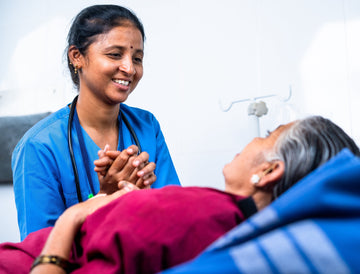
Caregiving for the elderly is tough and a long-drawn process of vigilance & care. If you’re a caregiver, you must not only be aware of the ailment or the assistance the ailing elderly confined to their beds might need but also work on improving the bedridden elderly’s quality of life by taking care of their hygiene, nutrition, and emotional wellbeing.
Here’re a few tips that can make caring for the bedridden elderly a tad easier and help keep complications at bay.
-
Ensure Good Grooming and Hygiene
Basic hygiene and grooming needs of bedridden patients include:
- Bathing “Bathing is crucial. Those who can be bathed with assistance must be regularly given a bath, others may need to be sponged on the bed.
- Dental care “Cleaning teeth by brushing every day is critical to prevent infections.
- Clothing “Changing bedridden patients into fresh and clean clothes every day is necessary to ensure that dirt, germs, and bacteria cannot cause harm. Soiled clothes of bedridden patients must be changed immediately to prevent bedsores or infections.
- Fingernails and toenails “Keeping the nails clean and clipped always will prevent injuries from scratching.
- Haircuts and shaving “Keeping hair, beards and mustaches trimmed, brushed, and cleaned will ensure a feeling of well-being.
-
Prevent Bedsores
Bedsores (also known as pressure sores) are injuries to the skin and underlying tissues. They are caused by sitting or lying in a single position for long periods of time. Bedsores most often develop on skin that covers bony areas of the body, such as the heels, ankles, hips, and tailbone. The good news however is that bedsores can be prevented.
The following tips can help a caregiver in preventing bedsores:
- Change the position of the bedridden at least every 2 hours.
- Keep the skin clean and dry.
- Keep the skin well moisturized.
- Make sure the bed sheets are smooth and not wrinkled.
- Sheets should be cotton or silk-like fabric.
- Eating a well-balanced diet is important.
- Avoid dehydration.
- Inform the doctor of any redness or skin color changes if noticed.

-
Change Bed Linens Regularly
It is necessary to regularly change the bed sheets as they can get soiled. Make sure the new linen sets have been adequately cleaned before use. Ensure the fabric is soft and does not cause friction with the skin. Blankets too must be washed regularly and must be kept clean.
-
Ensure Good Nutrition
Try to provide a well-balanced diet to the bedridden elderly to ensure they remain healthy. Ensure they take adequate water and stay hydrated. If he/she has diabetes mellitus, strictly follow the dietician's or doctors’ advice on nutrition.
-
Craft a Comfortable Environment
- Ensure the room is well-lit, and with natural light if possible.
- Keep passage to the bathroom easy and free of clutter.
- Place the bed within the reach of a bedside table or a nightstand with easy access to an alarm, phone, book, food, and water.
- Air the room from time to time to get rid of stale air and allow fresh air to come in.
- Keep distractions to a minimum, especially during rest periods, to ensure that the bedridden patients get the sleep they need.
-
Employ Patience and Empathy
Find time to spend with the ailing elderly confined to bed. They need your time. Read to them, chat with them, and try to cheer them.

-
Seek Help When You Need
Sometimes as a caregiver, you may feel fatigued or stressed out. If you need to take a break, then enlist the help of another family member or seek professional help from nurses or trained caregivers.
Caring for bedridden elderly individuals requires patience, vigilance, and empathy, but with the right approach, it can significantly improve their quality of life. By focusing on their hygiene, nutrition, and emotional well-being, and by taking proactive measures such as preventing bedsores and ensuring a comfortable environment, caregivers can help minimize complications and make the caregiving process more manageable.
It's essential to remember that caregiving is a shared responsibility—don’t hesitate to seek help or support when needed to ensure both you and your loved one receive the best care possible.



